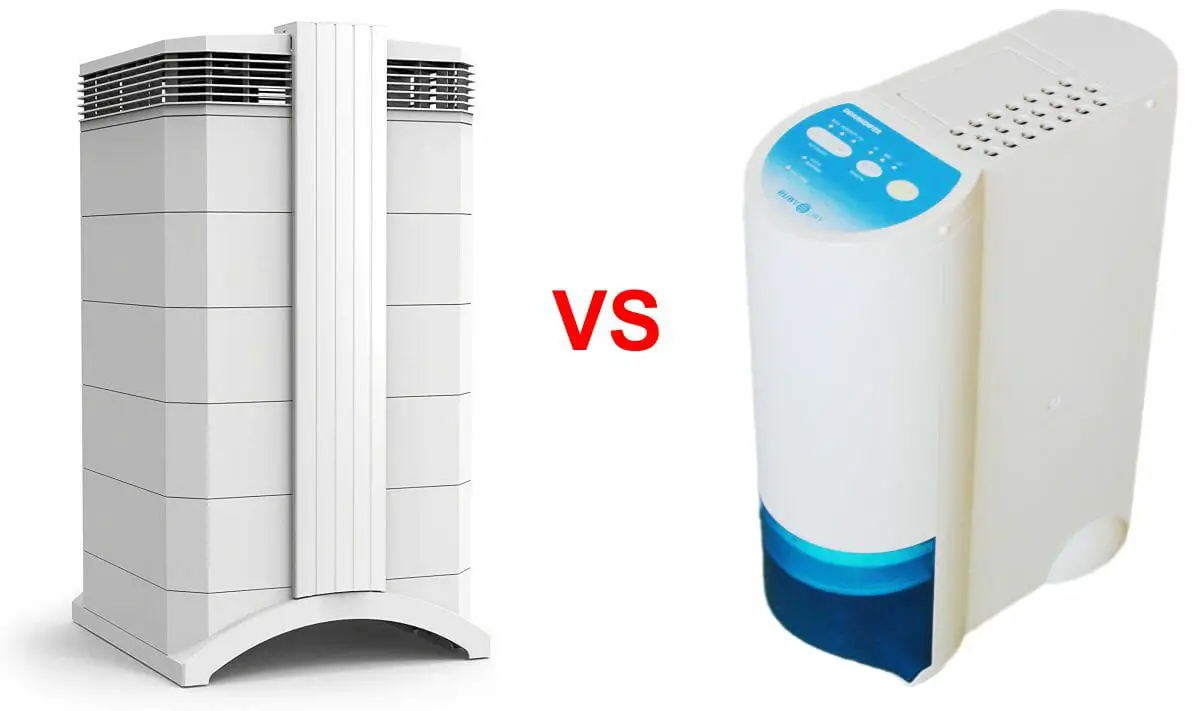It is great to be able to relax in the home where the air is clean and not too humid. Dehumidifiers and air purifiers can both help, and they both process the air with filters. So it is natural to consider which would be best for you. There are some obvious and not so obvious differences and which I outline below.
As a general rule an air purifier is excellent at removing particles from the air but does not remove water vapor from the air. Conversely, a dehumidifier is great for removing water from the air, but it’s filter is not efficient at removing particles from the air.
If your air is humid, you will certainly feel more comfortable when the dehumidifier reduces the humidity. For some people, especially those with asthma, their breathing will also be better. Other symptoms of high humidity include a stuffy nose and dehydration. Dehydration occurs because high humidity affects the ability of the evaporation of sweat to cool our body so we sweat more. Removing excess moisture can improve air quality by reducing the tendency for mold to grow in the home. This is usually only a factor if the relative humidity is above 80%. However, even at humidities above 50% house dust mite can multiply.
I have outlined the differences between an air purifier vs dehumidifier to help you when deciding which to buy-
1) An Air Purifier Has No Way of Removing Water From the Air
An air purifier blows air through a filter which removes from the air particles. Water vapor will go with the gases in the air through the filter. The water in water vapour is not in droplets but as single molecules of H2O which can easily pass through any filter. So air purifiers do not help with moisture. Air purifiers only remove particles from the air, such as pollen, mold spores, and pet dander.
A dehumidifier has cooling coils which will cause water vapour to condense and remove moisture from the air so lowering the humidity. But, you can also buy dehumidifier and air purifier combinations.
Your air conditioner will also reduce the moisture level in the air when it is running. This is because moisture from the humid air condenses on the cooling coils. However, there will be times when the HVAC fan is off, and also areas of your home where the system does not reach such as a basement or attic. So other solutions are necessary as I discuss below.
2) The Air Flow Through an Air Purifier is Higher Than That Through a Dehumidifier
A large air purifier (iQair HealthPro Plus) will have an air flow of 330 cubic feet per minute and a large dehumidifier (Honeywell TP70WKN) 180 cubic feet per minute.
3) The Filters in an Air Purifier and Dehumidifier are Very Different
Any air purifier that you buy should have a true HEPA filter. HEPA filtration is now really the basic standard and certifies that the filter removes 99.97% of airborne particles down to at least 0.3 um diameter. A dehumidifier has a filter that is very basic and is only able to catch large particles of dust that will clog up or coat the dehumidifying coils. It will not remove the small and ultrafine particles that affect your health which a HEPA air purifier will.
The filters in a dehumidifier are flimsy and design to protect the machine, not your health. They will not even reliably remove air pollutants such as airborne allergens such as house dust mite. This is the main reason that dehumidifiers cannot properly purify air.
The removal of particles from the air is arguably the most important part of improving indoor air quality. This is because some particles are so small that they can enter our bloodstream. It has recently become apparent that the incidence of serious illness increases even within the range of airborne concentration currently certified as safe.
There are now a few combination machines in which a dehumidifier has a HEPA filter.
However, in addition to removing particles air purifiers also have an activated carbon filter to remove other airborne contaminants such as chemicals from the air. These filters will also reduce ozone.
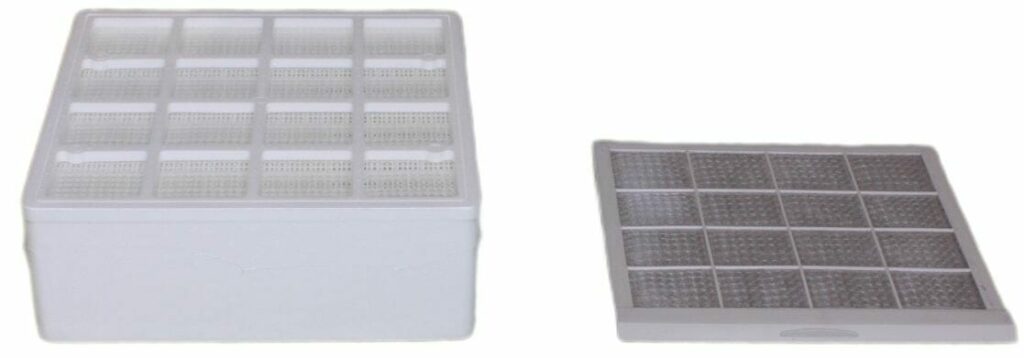
4) The Power Consumption of a Dehumidifier is Much Higher Than an Air Purifier When it is Running
In general a large air purifier will use 120 watts when operating, whereas a large dehumidifier will use 600-800 watts when operating. Of course the air purifier will be on all the time whereas the dehumidifier will only come on when the humidity exceeds the target that you have set. So overall their energy consumption may be similar depending on how much humidity there is in your home.
5) A Dehumidifier Emits Heat and Slightly Warms a Room
Because of the higher power consumption of a dehumidifier, heat is dissipated from the pump. Also, by taking water vapour (water in a high energy state) and condensing water into a liquid (a low energy state), energy is released into the room. If you put your hand by the outlet of the dehumidifier you will feel the warmth.
This video explains why this happens- (up to 3:30 after that it becomes an advert)
An air purifier does not emit a significant amount of heat.
6) It is Easier to Use Your HVAC System as a Whole House Dehumidifier Than an Air Purifier
A dehumidifier can be installed into your HVAC system. Then you will not need to be constantly emptying stand-alone units around the home. I may be lazy, but I simply like systems that have as little maintenance as possible. So this is the option that most appeals to me and I have written an article about it here which outlines the pros and cons. It is worth reading before you buy a dehumidifier, as you may find you like the idea of a dehumidifier built into your HVAC system.
However, your HVAC unit will often not reach some areas of your house, for instance, the attic or basement. For these areas, a standalone dehumidifier may be the best choice.
It is not so easy to turn your HVAC system into a whole house air purifier, although great improvements can be made to the quality of the air filtration of your HVAC system.
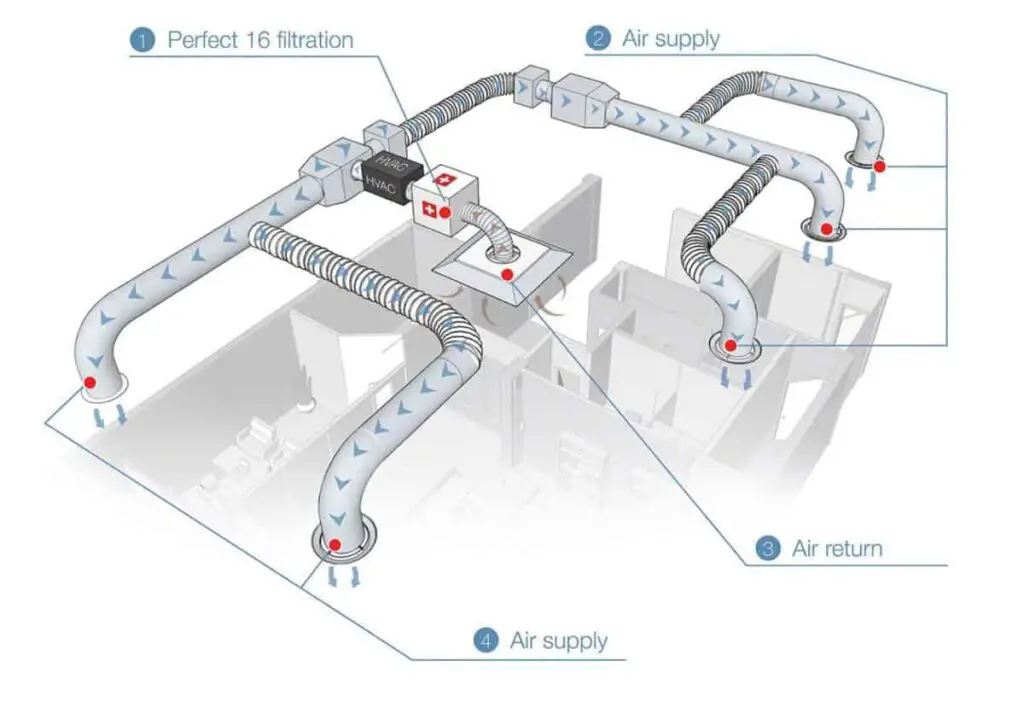
7) An Air Purifier and Dehumidifier Need Different Types and Frequency of Maintenance
A dehumidifier will need its tank emptying every day or two and cleaning regularly. An air purifier does not need any day-to-day maintenance but will need filter changes every 6-18 months.
8)They Need Different Monitoring
You will know if you need a dehumidifier by measuring the humidity in your room, using a hygrometer. This will tell you the exact humidity as a percentage. The most comfortable humidity range for most people is 30% to 50%. The EPA state that if the humidity is over 60% then mold can grow in the home. House dust mite grow best when the humidity is more than 50%. These levels are often reached throughout the year in the average home. Hygrometers can be brought for as little as $20 but it is probably best to pay a little more for a more reliable model.
It is important that an air purifier’s performance is measured as the particles that they cannot see damage health, smelt or otherwise reliably sensed reliably us. Air quality meters range from $25-4000. Please see this article.
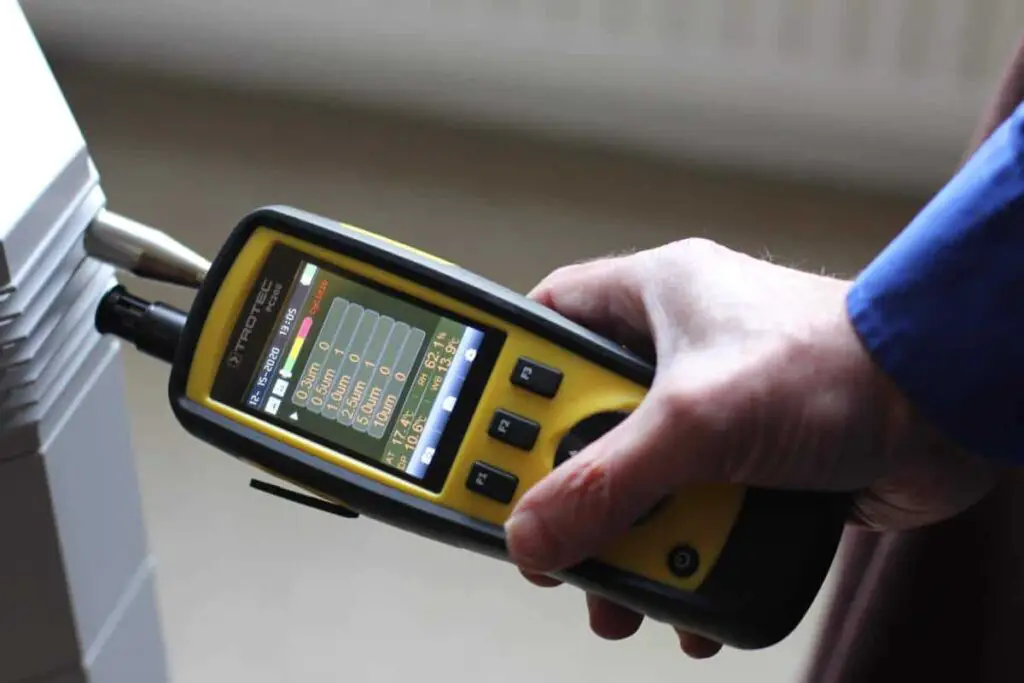
In View of the Differences What’s Better for Mold, an Air purifier or a Dehumidifier?
Mold needs water to thrive. The ideal conditions for mold are a dark, damp basement. So, the drier your house and the more sunlight it gets, the harder it is for mold to grow. In the opinion of the Environmental Protection Agency of the US, to stop mold growth, the humidity in the room should be less that 60%.
As mold needs moisture to grow, a dehumidifier is better at preventing growth of mold in the first place. However, if mold does grow, an air purifier can effectively remove mold spores from the air that passes through the air purifier. Although an air purifier will remove 99.97% at least of mold spores from the air passing through the purifier, because of the practicalities of air purifier positioning and leaking of air into the room you will be doing well to reduce levels in the room air by 80%.
Can These Different Appliances be Used Together?
As a result of their differences using a dehumidifier with an air purifier works well. The air purifier will remove particles from the air but not water and a dehumidifier removes water but not particles. However, you can also get an air purifier and dehumidifier combo unit. This is basically a dehumidifier with a more powerful fan and a HEPA filter.
Conclusion-air purifier vs dehumidifier
So as you can see, there are many factors in considering whether to buy an air purifier vs a dehumidifier. However, the main one is that an air purifier only removes particles from the air, and a dehumidifier can only remove water from the air.
Removing particles from the air will not make you feel more comfortable, but it will protect your health. Conversely, dehumidifiers will make you more comfortable by removing water from the air, but do not purify the air. So that you will feel better but you will not have the health benefits that are seen with a lower particle count in the air. As they have complementary benefits, you may wish to buy both!
Or you could buy a combined unit, these are dehumidifiers with a HEPA filter. As I mentioned above, the problem with this is that the air purifier needs a high airflow to reduce particle count but with a high air flow a dehumidifier will not work so well as the air will not be cooled as well by the cooling coils. So this type of machine will be a compromise and not usually be able to purify a large room.
Otherwise, if you have an HVAC system, you can discuss with a professional about how to get a dehumidifier built in and upgrading the filter to HEPA or at least MERV 16 standard. In this way you can try to get both particle reduction and dehumidification for your whole home without lots of individual appliances. This will really save on maintenance, as you will not have to empty and clean a portable dehumidifier regularly. The downside is that the particle removal from the air will not be quite as good as having an air purifier in the room. Regarding using your HVAC system as a whole home air purifier, please see this article.
An important point is that whatever you decide to do, you will need measurements of humidity and particle count to see if your appliances are effectively improving the air in your home.
I hope that this article has given you useful information in making your decision.
People Also Ask
Related Articles
Air Purifier Dehumidifier Combo
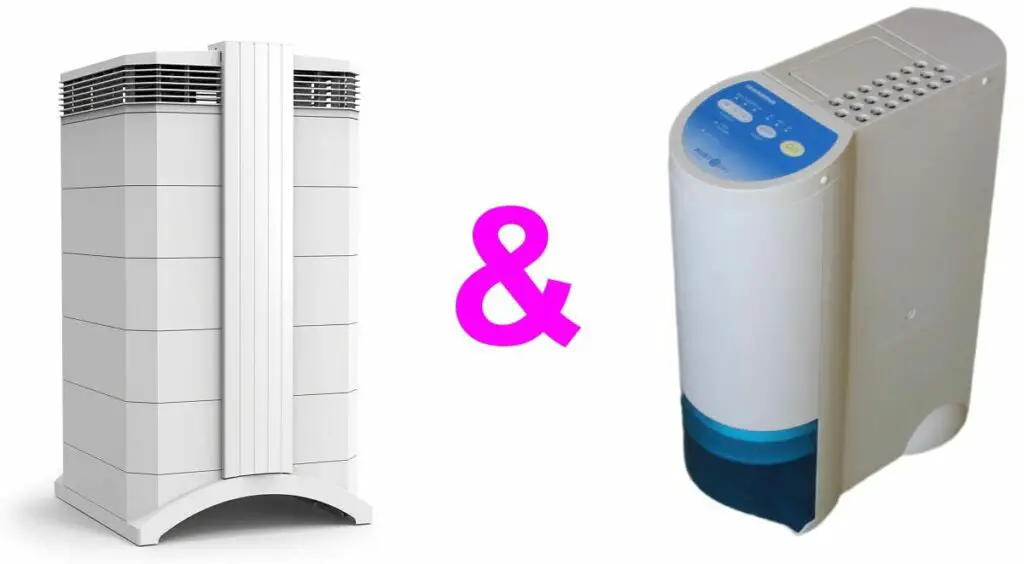
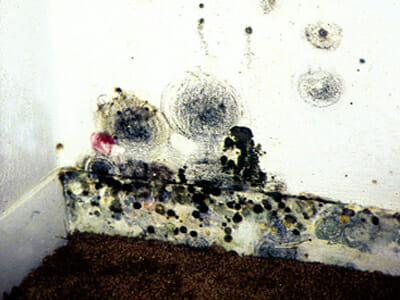
Health Problems From Air Pollution
Difference Between an Air Purifier and a Humidifier

